Cats are excellent hunters. They stalk their prey and wait for the right moment to attack. That’s also why cats have a lot of patience – much to the dismay of their owners when they patiently meow outside the bedroom door without any signs of slowing down. Let’s look at why cats meow outside your bedroom door at night and what you can do about it.
Table of Contents
Why your cat is meowing
Most cat owners already know this: Your cat keeps meowing at the door because it doesn’t like closed doors. A closed door makes its territory smaller. Also, cats are very active at dusk and at dawn, they want to go out hunting and be entertained, so it’s particularly boring if their human is sleeping rather than playing with them. Or maybe your cat wants to cuddle up to his favorite human – after all you’re warm and then he’ll also have easier access to get you out of bed when he gets hungry in the morning.
So your cat sits down in front of your door and starts meowing, trying to get you to get up, pay attention to him, play with him or, if he is particularly lucky, maybe you’ll even feed him.
Now you have several options of how to react to your cat, which all make sense. Let’s look at things you should definitely not do lest you make the situation worse.
What you must not do
If your cat won’t stop meowing at night, you might be annoyed and think: “Ugh, I’ll just get up and feed the little bugger so he’ll finally shut up.” It might work at first, but what you’re teaching your cat if you do this is that he only needs to meow long enough for you to get up and feed him. So he will do this more often from then on.
It’s similar if you as an annoyed human step outside your bedroom door and splash your cat with your water pistol. This will likely make your cat stop trusting you, on the other hand the cat registers that you actually got up and paid attention to him. So, again, he’ll start showing that kind of behavior more often. The general rule for teaching your cats is: Positively enforce good behavior, never punish negative behavior.
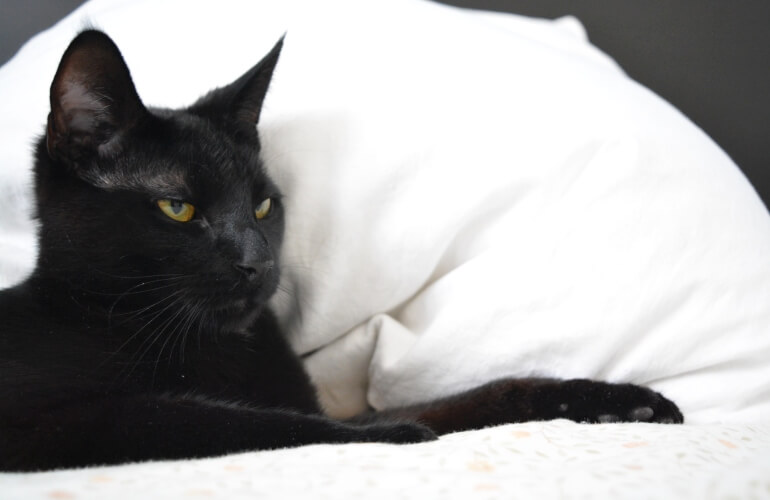
How to stop your cat from meowing
Let’s look at a few strategies that are often recommended for getting your cat to stop meowing. Try all of them to see which one will turn your meowing cat into the perfect companion.
Exhaust them
One thing that can help is to extensively play with your cat before you go to bed. 10 to 15 minutes of play-time with their favorite toy and your cat will be exhausted and maybe sleep in the next day. If you reward your cat after play-time with a bit of food, this might also help your cat to not wake you too early with a growling stomach.
This might have the possible negative side effect that your cat gets restless when it’s time for you to go to bed because it wants to get food. Give it a try and see how your cat reacts.
Keep them busy
If your cat is bored, whether in the morning or late at night, cat activity toys might be the answer. These come in various shapes and sizes, like the treat blanket* or a snack ball*. I used to think activity toys can’t be very effective with our cats, as they like to eat up any food in record time and they surely wouldn’t wait until the morning fish any treats out. However, as it turns out, the treat blanket I mentioned was very effective in getting my cats to be quiet in the morning as well as at night. But every cat is different!
Automatic feeder
If your cat is meowing because it gets hungry, an automatic feeder might do the trick. The idea here is to separate the human getting up from the cat receiving food. Another way of doing this is to not feed your cat directly after getting up. If you get up and not immediately make your cats your first priority, you can also disconnect them from the idea that your getting up means them getting fed. Maybe have your shower before you feed them or feed them right before you leave the house instead.
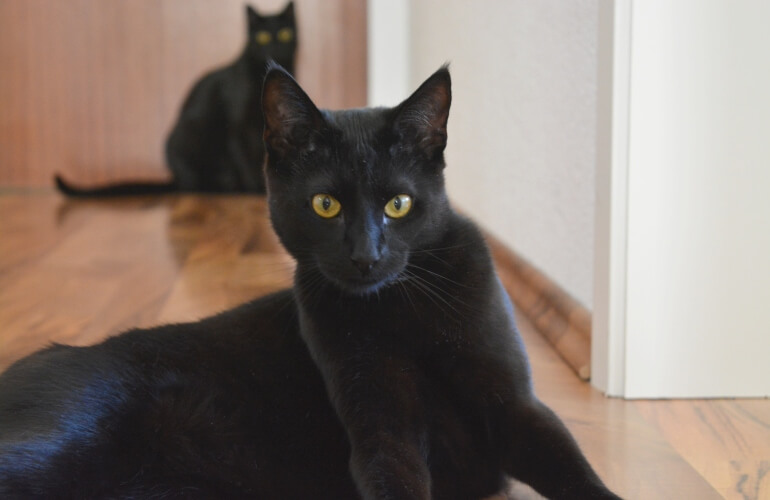
Patience
If none of this works, patience is an effective way to stop your cat meowing – even though there are certainly many other things you’d rather be doing than ignoring a cat that is meowing outside your door for a few days or weeks.
This method works by you completely ignoring your cats meowing until it realizes it has no effect on you. Don’t quietly (or loudly) curse at your cat through your door, don’t talk, don’t sigh; those are all reactions and a reaction is what your cat wants. Just pretend nothing is happening. Pro tip: get yourself some earplugs.
As mentioned before, the problem here is that cats are incredibly patient. Wrex meowed outside the door for two and a half hours at his worst – that’s not fun. Also, you’ll have to get up eventually and I for one am not having a good day if I started it deprived of sleep. If you do manage not to react, your cat will eventually realize that its attempts are fruitless. Unfortunately it gets worse before it gets better. You’ll need nerves of steel, but at least this method is completely free!
Gust of air
This method is not completely free: You can buy a device with a sensor that will blow air at your cat if it comes to close. You can find this on Amazon by the name Ssscat* – however, it’s really not cheap. (According to Amazon reviews you can also buy a normal can of pressurized air at any hardware store to refill the Ssscat to make it a bit cheaper – but I’ve neither tried to Ssscat nor any refills for it.)
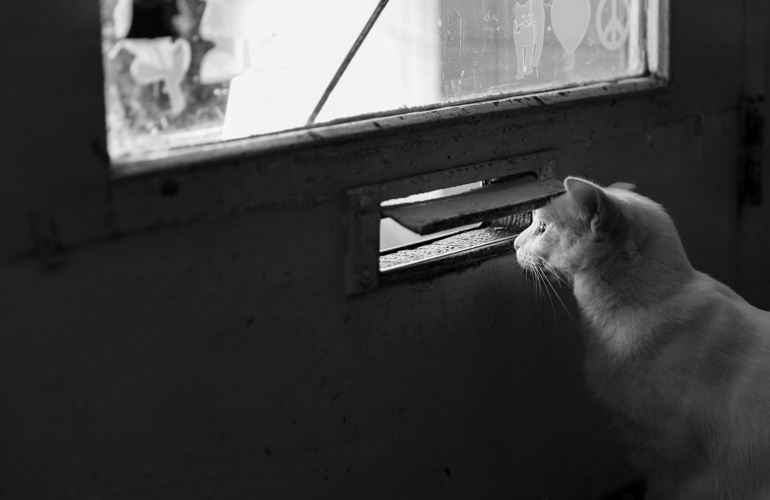
Vacuum cleaner
I’ve also read this recommendation various times now. Put a vacuum cleaner outside your door, pull the cable through underneath your door (if possible) and either put it in a socket with an on/off switch or leave the plug out. In other words, your vacuum cleaner should be set to “ON”, but the plug should not be connected.
Now you wait for your cat to show up and meow, and once it does, you plug in the vacuum cleaner (or turn on the socket it’s connected to). Just like the air blowing device above, this will scare your cat but your cat won’t associate it with you. It’ll think the vacuum gods are against it and avoid your bedroom door in the future.
At least this is how it should work in theory – whether it will work with your cat can only be found out by testing the method. If you can’t fit the vacuum cleaner cable through your door, you can try with a remote-controlled socket. Needless to say, this likely won’t work with a Roomba either.
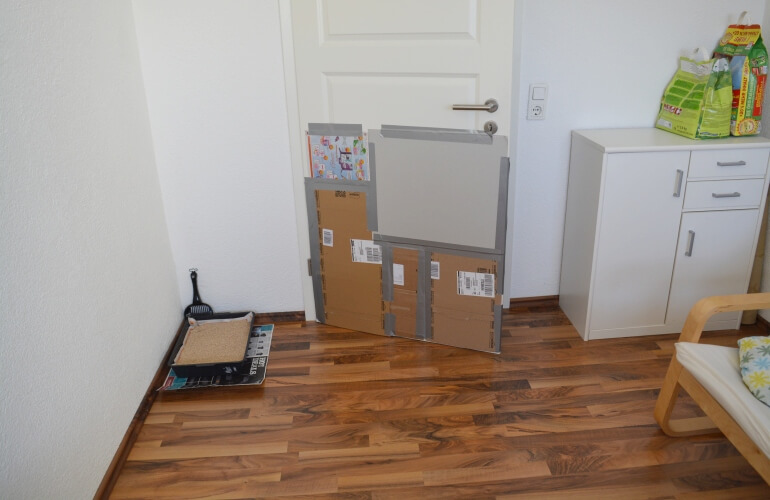
When cats start scratching your door
I’d also like to mention something even worse than cats meowing outside your door: Cats scratching at your door. It’s clear in this case that you want to protect your door. You can do this with double-sided sticky tape or Sticky paws*, as cats don’t like to get their paws sticky. When we first got our cats, we stuck cardboard on our door, just in case. As kittens, they were only allowed to be in this one room at first before the rest of the apartment was added to their territory, so we wanted to make sure the door didn’t take damage in case they really wanted to get out. Luckily they were good boys and didn’t damage the door or the cardboard. The sticky tape was also easy to remove at the end.
I hope those ideas will help you get your cats to stop meowing. If you have found any other effective means of stopping your cat from meowing, feel free to share in the comments!
Balconycats.com is a participant of the Amazon Services LLC Associates Program, an affiliate advertising program. Links marked with an asterisk (*) are affiliate links. If you buy a product through an affiliate link, we will get a small commission without extra cost to you. This helps us earn an income off the free content we provide to you. Thank you for your support!

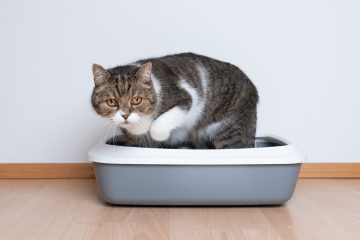

1 Comment
Sophia · February 1, 2024 at 7:35 am
I just had this experience last night and was looking for information on blogs such as PetCareRx and PetMD. I wish I had come across your post sooner.